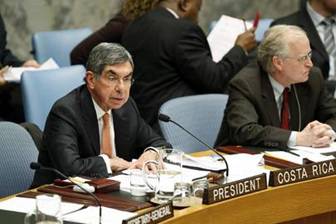 |
Costa Rica President Oscar Arias presiding over the UN Security Council debate on military spending |
On Wednesday 19 November the United Nations Security Council, under the Presidency of Costa Rica, held an historic open debate on implementation of UN Charter Article 26, which calls for the regulation of armaments in order to ensure the least diversion of human and economic resources from global needs.
The debate was held against a background of increasing global military expenses despite a global economic crisis, and a lack of commitment by governments to meeting the UN Millennium Development Goals.
The perverse logic that leads a poor nation to spend excessive sums on its armies, and not on its people, is exactly the anti-thesis of human security, and a serious threat to international security.
- Oscar Arias
UN Security Council
November 19 |
UN Secretary-General Ban Ki-moon, in a speech to the Security Council, urged countries to fully support new international transparency measures relating to military expenditures as steps towards confidence building and multilateral disarmament.
Costa Rica President and Nobel Peace Laureate Oscar Arias presented a concept paper to the Security Council which discusses the development of regional security mechanisms that can assist countries relinquish their reliance on militarism. Costa Rica abolished its armed forces in 1948 and has been instrumental in the development of peace and demilitarisation in Central America. In his speech to the Security Council, President Arias also promoted the Costa Rica Consensus which he initiated in 2006 and which calls for debt relief to developing nations that commit to reducing their military expenditures.
In a presidential statement issued at the end of the day-long gathering, the Council expressed concern at rising military expenditure worldwide, and urged appropriate levels of spending and continued commitment to achieve the eight anti-poverty Millennium Development Goals, and announced that it would continue to consider the issue.
PNND Co-Presidents Senator Abacca Anjain-Maddison (Marshall Islands), Marian Hobbs MP (New Zealand), Mikyung Lee MP (Republic of Korea), Alexa McDonoughMP (Canada) and Uta Zapf MP ( Germany) released a statement earlier this year appealing "to world leaders and all citizens to re-dedicate themselves to implementing the goals of the United Nations for a world of peace and security through disarmament, the non-violent resolution of conflicts, and the reallocation of resources from military budgets to meet social and development goals." The statement entitled "The priority of peace and disarmament for the global community" was released on May 24 to commemorate International Women’s Day for Disarmament.
PNND Council members Senator Rosario Green (Mexico) and Jonathan Granoff (USA), addressing a special session of the Inter-Parliamentary Union held in the United Nations ECOSOC Chambers on November 20-21, called on parliamentarians to become more active in the promotion of human security goals in collaboration with the United Nations and other international agencies.
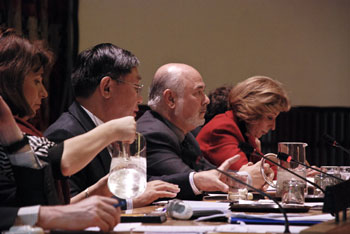 |
|
Ambassador Shigeki Sumi (Japan), Mr. Jonathan Granoff (GSI) and
Senator Rosario Green (Mexico) |
|
The need for governments and institutions to address human security is made all the more apparent in this time of economic upheaval. As Senator Green said,* "One of the first signs of a slowdown in the economy is unemployment, severely injuring economic security and generating social and political instability which in the short time will do little to contribute to consolidate the delicate process of restoring and maintaining peace in which the United Nations is engaged, and quite possibly may lead to new conflicts."
"Bridges must be built to address the protection of the global commons -- the oceans, the climate, and the rainforests -- the living systems upon which all civilization depends," Mr. Granoff said. "Bridges must be built to address the systemic poverty in which half the world lives. Nuclear weapons present walls where bridges to collective security must also be built. To integrate human security with real policies, politicians must answer these three questions: What are your plans to address poverty? What are your plans to protect the global environment? What are your plans to eliminate nuclear weapons?"
Mr. Granoff also urged parliaments to ensure that all secondary school students have as part of their curriculum the study of the Universal Declaration of Human Rights. He further highlighted the five proposals of the Secretary-General to move toward a nuclear weapons free world and urged support for the Costa Rican Consensus presented to the Security Council, whereby countries that spend less on militaries and more on education and health would benefit.
The Inter-Parliamentary Union, founded in 1889 by William Randal Cremer (United Kingdom) and Frédéric Passy (France), is an international organisation of parliaments with special status at the United Nations. IPU provides forums for parliaments and parliamentarians to discuss and collaborate on key global issues. 150 national parliaments and 8 regional parliaments are members. PNND and IPU are collaborating on an international program to increase and enhance parliamentary involvement in non-proliferation, disarmament and related security issues.
For more information see PNND and the Inter-Parliamentary Union.
*Read the full text of Senator Green's statement in the original Spanish. The unofficial English translation was prepared by PNND.
| |
 |
| |
Jonas Gahr
Støre,
Norwegian Minister of Foreign Affairs |
In early November the Norwegian Parliament Standing Committee on Foreign Affairs discussed a White Paper on Disarmament and Non-Proliferation submitted by the Ministry of Foreign Affairs.
The White Paper recommends “ that Norway should take a proactive role in promoting arms control and disarmament as regards nuclear weapons, other weapons of mass destruction and conventional weapons” and argues that improved security for all can be achieved at considerably lower levels of armaments than those that exist today…Furthermore, extensive disarmament will free up substantial resources that can be used for human and social development.”
The paper supports a number of steps toward nuclear disarmament but stops short of supporting the commencement of negotiations on a Nuclear Weapons Convention quoting the view of “a number of countries” that “such negotiations would not result in an agreement, and that they could undermine the NPT.”
A counterview, that such negotiations are required in order to ensure a balanced implementation of the NPT and bring in the States not yet parties, can be found in the UN Secretary-General’s five-point plan for nuclear non-proliferation and disarmament and in the paper A Nuclear Weapons Convention and the NPT: Diversion or Enabler?
The Foreign Affairs Committee concluded mostly in favour of the White Paper and noted specifically that they “believe it is necessary that NATO continually assess its nuclear weapons strategy to reduce the role of nuclear weapons in international politics. The goal is the complete abolition of nuclear weapons.” The committee also referred to NATO’s current review of its Strategic Concept and noted that “The NATO summit in 2009 will likely decide on whether the strategic concept should be opened for changes in connection with the discussion on the transatlantic charter. The Committee believes that in this work, NATO's nuclear strategy has to be brought up for discussion."
The paper was also debated in the full parliament of Norway on 20 November coinciding with an article by Minister of Foreign Affairs Jonas Gahr Støre "A world without nuclear weapons".
| |
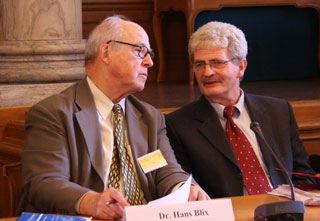 |
| |
Dr Hans Blix and Holger Nielsen at the Pugwash symposium |
On November 17, the Danish Section of Pugwash held a symposium on Strengthening the nuclear Non-Proliferation Treaty in the Danish parliament featuring Dr Hans Blix (Chair of the Weapons of Mass Destruction Commission), Holger Nielsen (PNND member and Danish member of parliament), Carlos Vargas (international lawyer from Costa Rica), Hans Christensen (Federation of American Scientists), Dr. Ali Asghar Soltaniyeh (Iranian Ambassador to the International Atomic Energy Agency), Pol D'Huyvetter (Coordinator of Mayors for Peace 2020 Vision Campaign) and Alyn Ware (PNND Global Coordinator).
Holger Nielsen used the symposium as an opportunity to encourage the government of Denmark to support nuclear disarmament initiatives at the NPT Review Conference, develop a European Strategy for a nuclear-weapons-free world and initiate an Arctic Nuclear Weapon-Free Zone.
"Because of climate-change and the melting of ice there will be a heavy increase in ship-traffic through the North-West-Passage and the North-East-Passage. Natural resources in this area will be available and create a new base for conflicts…Tensions always get more dangerous when the involving partners possess nuclear weapons. And the Arctic has all preconditions to become a high-tension area. Therefore the Danish government should take an initiative to a treaty, where Arctic is declared a nuclear-weapon-free zone.”
See:
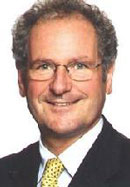 |
|
Luxembourg Mayor Paul Helminger |
|
On November 9, Luxembourg Mayor Paul Helminger hosted an academic conference at Luxembourg City Hall featuring Tadatoshi Akiba, Mayor of Hiroshima and President of Mayors for Peace. Mayor Helminger, who also serves in the Luxembourg parliament and is a member of PNND, used the occasion to join Mayor Akiba in promoting the Hiroshima-Nagasaki protocol – a proposal to the States Parties to the nuclear Non-Proliferation Treaty to adopt a plan for the prohibition and elimination of nuclear weapons leading to a nuclear weapons convention.
In his speech to the conference Mayor Helminger stressed the importance of cities becoming involved in international issues particularly relating to peace and security. He noted in particular the role that the city of Luxembourg has played in the development of economic and political institutions that have helped build a more cooperative security in Europe.
With regard to nuclear weapons, Mayor Helminger reaffirmed that the only way to protect citizens in cities from a nuclear attack is to achieve the total abolition of nuclear weapons. Mayors and parliamentarians have similar roles in protecting their constituencies from the threat of nuclear catastrophe. In this regard, PNND and Mayors for Peace collaborate on a number of initiatives including the Statement of Mayors and Parliamentarians for a Nuclear Weapons Free World.
See also US Conference of Mayors Adopts Resolution in support Hiroshima-Nagasaki Protocol
On 22 November, 31 mayors from the Czech Republic sent a letter to US President-elect Barack Obama urging him to review the US plan to deploy a military radar base on Czech territory as part of the US National Missile Defense (NMD) system. The mayors noted that the Czech government has signed agreements with the United States that are due to be ratified shortly by the Parliament, but that two thirds of the Czech citizenry do not agree with the arrangement.
"The plan to place elements of this system in the heart of Europe is causing tension between USA and Russia, as well as between USA and the European Union, and will lead to a new expansion of the arms race. We are concerned that due to this advanced system, Europe will become the main battlefield in a potential international conflict and that the Czech Republic would be, due to the radar, the target of a first attack. The matter is made even more sensitive by the fact that after the fall of communism in 1989, the Czech people vowed that a foreign army would never again be stationed on their territory."
President-elect Obama has not yet replied to the letter. However, during the US election campaign Obama announced a cautionary approach to missile defence deployment in Europe stating that it “ must be proven to work and pursued as part of an integrated approach that uses the full range of nonproliferation policy tools in response to the full range of threats we face. As president, I will make sure any missile defense, including the one proposed for Europe, has been proven to work and has our allies’ support before we deploy it.”
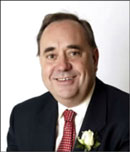 |
|
Scottish First Minister Alex Salmond |
|
In October 2007 Scottish First Minister Alex Salmond sent a letter to States Parties to the Non-Proliferation Treaty requesting observer status for Scotland at the 2010 NPT Review Conference. Salmond indicated the support from his government for the NPT and the interest of Scotland in the NPT Review Conference considering that UK nuclear weapons are deployed on submarines based in Faslane, Scotland. He noted that in June 2007 the Scottish Parliament had debated the role that Scotland could play in encouraging UK action to honour and implement their obligations under the NPT, and in this regard had voted to oppose renewal of the UK Trident nuclear weapons system (See Scotland asks for observer status at the NPT).
The request for NPT observer status has been supported by Scottish parliamentarians, most recently in June this year by parliament motion S3M-00146 submitted by Sandra White MSP . The motion “considers it appropriate for Scotland to be accorded observer status to the committee in view of the precedent set by Palestine and the fact that Britain’s nuclear deterrent, the Trident missile system, is stationed in Scotland, and encourages the Scottish Executive to consider what course of action could be taken to achieve this end.”
| |
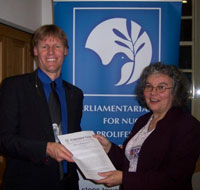 |
| |
PNND Global Coordinator Alyn Ware and Marlyn Glen MSP with a parliamentary declaration supporting a nuclear weapons convention |
On November 19, PNND Global Coordinator Alyn Ware spoke to a cross-party group of Scottish parliamentarians on ways that they could become active in disarmament initiatives at the NPT including promotion of negotiations for a Nuclear Weapons Convention. A number of parliamentarians at the meeting endorsed the Parliamentary Declaration Supporting a Nuclear Weapons Convention which PNND plans to present to the NPT Prep Com and the United Nations General Assembly in 2009.
The meeting was preceded by motion S3M-02625 submitted by Jamie Hepburn MSP commending Parliamentarians for Nuclear Non-proliferation and Disarmament . The motion “welcomes the cross-party, cross-ideological and international approach adopted by PNND to this issue; congratulatesPNND for its work, and calls on all members of the Parliament with an interest in nuclear disarmament to consider endorsing the parliamentary statement supporting a nuclear weapons convention being circulated by PNND, which will be presented to the United Nations to support disarmament initiatives.”
On September 17, 2008 Bill Kidd MSP submitted motion S3M-2557 honouring PNND supporter and long-time nuclear disarmament advocate Dr Alan F Phillips who passed away in August. The motion “notes with sadness the passing away of Dr Alan F Phillips, who dedicated much of his life work to the elimination of nuclear weapons as a result of his involvement in the early development of radar during World War Two, leading to him becoming a leader in the field of radiation therapy and clinical radiotherapy, which in turn allowed him to gain an intimate understanding of the secrets of the atom that imbued him with a unique moral imperative to work for nuclear weapons elimination, and hopes that his passion and dedication to nuclear disarmament will serve as a shining example to all those seeking the same.” For a further tribute to Dr Phillips click here.
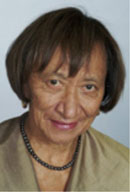 |
|
Georgina te Heuheu |
|
PNND member Georgina te Heuheu has been appointed the New Zealand Minister for Disarmament and Arms Control in the new government formed by the National Party following elections on November 8. New Zealand is currently the only country in the world which has a ministerial position specifically on disarmament and arms control. Ms te Heuheu has been a member of parliament since 1996. She was the first Maori (indigenous New Zealander) woman to gain a law degree in New Zealand. She is member of the Ngāti Tuwharetoa Iwi (tribe) and has long been active in indigenous issues, including having served on the Waitangi Tribunal (the key tribunal on indigenous claims). Ms te Heuheu also holds the positions of Minister for Courts, Minister for Pacific Island Affairs and Associate Minister of Maori Affairs.
| |
 |
| |
Sergio Duarte (UN High Representative for Disarmament) and Tadatoshi Akiba (Mayor of Hiroshima) unveiling an atom bomb exhibit at the United Nations. |
The United Nations Office of Disarmament Affairs produces an excellent email and online update on United Nations disarmament issues and initiatives (UNODA Update).
The November 2008 issue includes:
|


